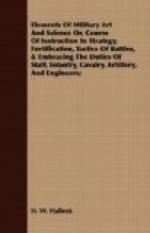From these data we see that the great European powers at the present day maintain, in time of peace, military establishments equal to about one-hundredth part of their entire population.
The geographical position of a country also greatly influences the degree and character of its military preparation. It may be bordered on one or more sides by mountains and other obstacles calculated to diminish the probability of invasion; or the whole frontier may be wide open to an attack: the interior may be of such a nature as to furnish security to its own army, and yet be fatal to the enemy should he occupy it; or it may furnish him advantages far superior to his own country. It may be an island in the sea, and consequently exposed only to maritime descents—events of rare occurrence in modern times.
Again, a nation may be placed between others who are interested in its security, their mutual jealousy preventing the molestation of the weaker neighbor. On the other hand, its political institutions may be such as to compel the others to unite in attacking it in order to secure themselves. The republics of Switzerland could remain unmolested in the midst of powerful monarchies; but revolutionary France brought upon herself the armies of all Europe.
Climate has also some influence upon military character, but this influence is far less than that of education and discipline. Northern nations are said to be naturally more phlegmatic and sluggish than those of warmer climates; and yet the armies of Gustavus Adolphus, Charles XII., and Suwarrow, have shown themselves sufficiently active and impetuous, while the Greeks, Romans, and Spaniards, in the times of their glory, were patient, disciplined, and indefatigable, notwithstanding the reputed fickleness of ardent temperaments.
For any nation to postpone the making of military preparations till such time as they are actually required in defence, is to waste the public money, and endanger the public safety. The closing of an avenue of approach, the security of a single road or river, or even the strategic movement of a small body of troops, often effects, in the beginning, what afterwards cannot be accomplished by large fortifications, and the most formidable armies. Had a small army in 1812, with a well-fortified depot on Lake Champlain, penetrated into Canada, and cut off all reinforcements and supplies by way of Quebec, that country would inevitably have fallen into our possession. In the winter of 1806-7, Napoleon crossed the Vistula, and advanced even to the walls of Koenigsberg, with the Austrians in his rear, and the whole power of Russia before him. If Austria had pushed forward one hundred thousand men from Bohemia, on the Oder, she would, in all probability, says the best of military judges, Jomini, have struck a fatal blow to the operations of Napoleon, and his army must have been exceedingly fortunate even to regain the Rhine. But Austria preferred remaining neutral till she could increase her army to four hundred thousand men. She then took the offensive, and was beaten; whereas, with one hundred thousand men brought into action at the favorable moment, she might, most probably, have decided the fate of Europe.




